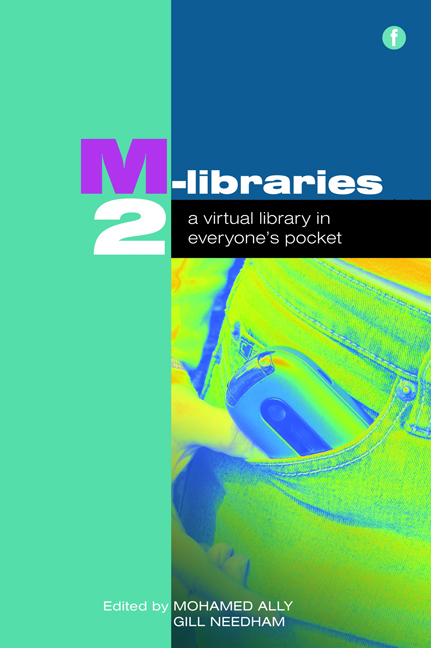Book contents
- Frontmatter
- Contents
- Acknowledgements
- Contributors
- Foreword
- Introduction
- PART 1 M-LIBRARIES: DEVELOPMENTS AROUND THE WORLD
- PART 2 TECHNOLOGY IN M-LIBRARIES
- PART 3 APPLICATION OF M-LIBRARIES
- PART 4 M-LIBRARIES AND LEARNING
- 18 Mobilizing the development of information skills for students on the move and for the workplace: two case studies of mobile delivery in practice
- 19 The library's place in a mobile space
- 20 M-libraries in distance education: a proposed model for IGNOU
- 21 Bridging the mobile divide: using mobile devices to engage the X and Y generations
- 22 Information literacy gets mobile
- 23 Library and Student Support (L&SS): flexible, blended and technology-enhanced learning
- PART 5 BUILDING THE EVIDENCE BASE FOR M-LIBRARIES
- Conclusion
- Index
18 - Mobilizing the development of information skills for students on the move and for the workplace: two case studies of mobile delivery in practice
from PART 4 - M-LIBRARIES AND LEARNING
Published online by Cambridge University Press: 08 June 2018
- Frontmatter
- Contents
- Acknowledgements
- Contributors
- Foreword
- Introduction
- PART 1 M-LIBRARIES: DEVELOPMENTS AROUND THE WORLD
- PART 2 TECHNOLOGY IN M-LIBRARIES
- PART 3 APPLICATION OF M-LIBRARIES
- PART 4 M-LIBRARIES AND LEARNING
- 18 Mobilizing the development of information skills for students on the move and for the workplace: two case studies of mobile delivery in practice
- 19 The library's place in a mobile space
- 20 M-libraries in distance education: a proposed model for IGNOU
- 21 Bridging the mobile divide: using mobile devices to engage the X and Y generations
- 22 Information literacy gets mobile
- 23 Library and Student Support (L&SS): flexible, blended and technology-enhanced learning
- PART 5 BUILDING THE EVIDENCE BASE FOR M-LIBRARIES
- Conclusion
- Index
Summary
Introduction
Increasingly, students come to their studies equipped with access to a number of mobile technologies. These may include laptops and mobile internet and – even more frequently – access to the internet by means of web-enabled mobile phones. There is much debate about the need for flexible content delivery to meet the perceived needs and expectations of students using such tools. What might constitute appropriate content? Can such devices deal with ‘new’ content or are they better harnessed for revision and reinforcement activity, as a supplement to other sorts of delivery rather than as stand-alone material? Or, does mobile delivery offer an entirely new kind of study and learning experience and, if so, when and where in the curriculum might this be appropriate? There is also, as yet, little literature available on the actual implementation of such mobile initiatives, the nitty-gritty, for example, of going beyond shrinking existing web pages to fit a mobile phone screen and writing content in a format that is tailored for the smaller screen. This chapter will look at case studies of two real-world projects (mobileSafari and iKnow) which have produced a range of information-skills mobile content that is intended to be delivered to learners in both formal and informal learning contexts, the one as part of a formal higher education programme and the other as part of a workplace-based initiative. Instructional design issues (including the creation of pedagogically sound generic templates), will be considered alongside related technical issues.
The mobile delivery in practice: real-world examples
Safari and iKnow
Safari is an online, open-access course designed to improve information literacy skills amongst Open University (OU), UK students. The course was conceived and developed and is maintained by the OU Library. In 2007 it was six years old and in need of rebranding and revision to include online skills, particularly techniques for evaluating web content. During the review we considered how and when students used the web resource. Conse - quently, in addition to a web version, we decided to develop a mobile device edition for access via phone networks, which might achieve better and wider access beyond that achieved by the existing web version.
- Type
- Chapter
- Information
- M-Libraries 2A virtual library in everyone's pocket, pp. 171 - 174Publisher: FacetPrint publication year: 2010

